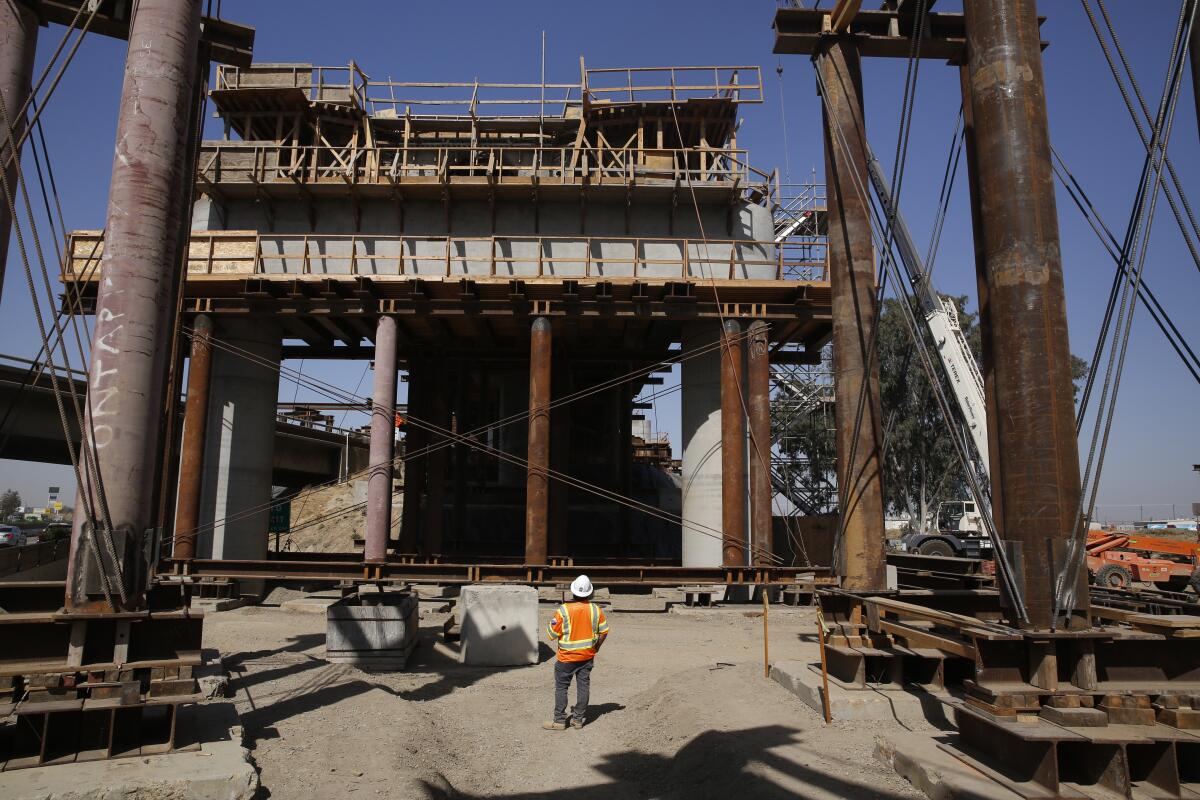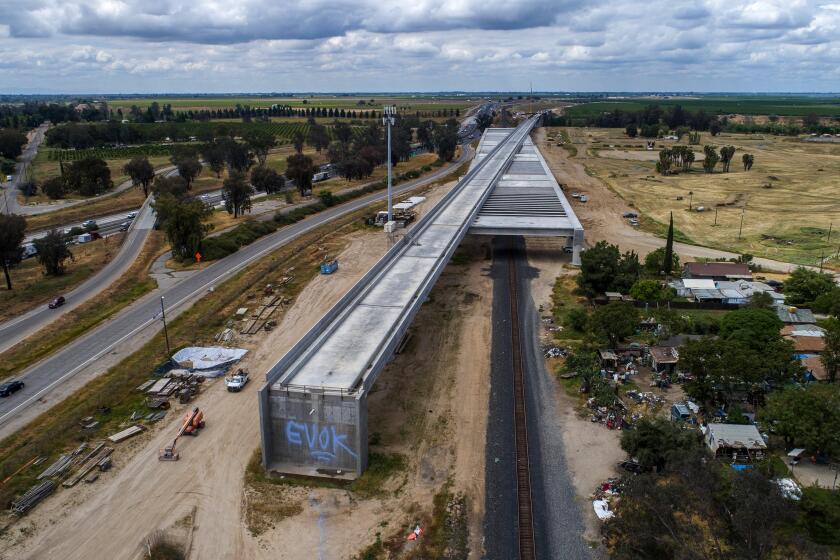No. 2 executive at California bullet train agency out after long investigation

- Share via
In a major shake-up to the nation’s biggest transportation project, the chief operating officer of the California High-Speed Rail Authority, Joe Hedges, abruptly left his job this week after a lengthy investigation by the agency and an outside law firm, The Times has learned.
The investigation began at least as early as December, when the rail authority board received an anonymous letter from a state employee alleging that Hedges overruled employee decisions and awarded large unmerited payments to contractors building the project, according to a copy of the letter The Times reviewed.
“Monday was Chief Operating Officer Joe Hedges’ last day with the California High-Speed Rail Authority,” rail authority spokeswoman Melissa Figueroa said in a statement Tuesday morning. “Until a permanent replacement is appointed by the Governor, CEO Brian Kelly is making necessary personnel moves internally to ensure continued progress on construction in the Central Valley.”
When contacted at home on Tuesday for comment, Hedges said about his exit, “All amicable, all good. I enjoyed my time at high-speed rail. It was a great honor to work with Brian Kelly.”
Asked if he was fired or forced out, Hedges, said, “I am eligible for state rehire. No comment.”
Hedges’ departure comes at a critical time for Kelly and his tenure at the agency, which is seeking a $4.2-billion appropriation from the Legislature and is also hoping for support from the Biden administration. A history of problems could affect requests for new funding.
When voters approved a bond issue to help build the Los Angeles to San Francisco system in 2008, it was supposed to cost $33 billion and be operational by 2020. Today, its cost is $100 billion or more and the completion date is undetermined.
Chief executive Roelof van Ark, a European engineer with experience building high-speed rail, was unexpectedly sacked in a 2012 board meeting. Jeff Morales, the successor chief, exited in 2017 after losing the confidence of the rail board. Roy Hill, the deputy chief operating officer and an executive of consultant WSP, left in 2019 amid an ethics investigation that later cleared him of any wrongdoing.
Below the top executives, land agents, attorneys and engineers have left. More than a half-dozen real property chiefs, the people responsible for supplying land for construction, have come and gone.
Kelly has said he is rebuilding the team. But the turnover is contributing to a loss of institutional knowledge, including how the project arrived at its current condition.
In the last year, letters from two separate contractor teams have warned the rail authority that its schedule can not be met because of inadequate land to build on. Environmental regulators have objected to design changes that violate previous permits. In 2019, steel cables supporting a bridge snapped and forced a repair effort.
After receiving the employee letter in December, the rail authority board formed a special panel, which it called the “special matters committee,” and held a series of confidential meetings with nothing on the agenda.
The rail authority also hired the law firm O’Melveny & Myers to look into the matter, according to rail authority financial records The Times reviewed. Figueroa said she could not comment on the investigation.
In a Monday afternoon statement, Tom Richards, chairman of the rail authority board, said the special matters committee had completed its work after reviewing the allegations.
Richards said the board hired a forensic accounting firm, in addition to the outside law firm, and concluded that there had been no fraud in the authority’s business practices, as alleged in the letter. He added that board had recommended that certain communications and documentation processes be changed, but did not elaborate on what those were. The board meeting is scheduled to resume on Wednesday, he said.
In addition to the internal investigation, the financial records indicate that the rail authority had received a federal subpoena. It does not make clear what the subpoena sought or whether a grand jury issued it.
Two attorneys from O’Melveny & Myers conducted extensive interviews with authority employees, asking pointed questions about Hedges, according to individuals who were interviewed by the law firm.
Those individuals declined to be identified because they were not authorized to speak with the media about the investigation, which has not been previously reported.
Hedges was appointed to the newly created position at the authority by former Gov. Jerry Brown in January 2018, following a six-month search, at a salary of $337,008 per year.
Hedges came onboard at about the same time that Kelly was hired as chief executive, a year after the prior chief executive exited.
It was hoped at the time that the new executives would invigorate the troubled agency, with Hedges tagged with the job of stanching cost overruns and delays that plagued the project.
Seven years after awarding a low-bid high-speed rail contract to a Spanish firm, California is paying for that decision in delays and cost overruns in the San Joaquin Valley.
Hedges came from the Washington Department of Transportation with 35 years of experience in construction. In Washington, he ran the program to build a tunnel through downtown Seattle, known as the Alaskan Way Viaduct Replacement program. It was one of the nation’s most ambitious urban tunneling projects, but also became known for a breakdown in the tunnel boring machine that caused a long delay.
Hedges retired as captain from the Navy Corps of Civil Engineers. His military background bought a hard-edged management style, according to agency employees who declined to be named.
Kelly took credit for hiring Hedges in 2018, saying at the time, “I made a commitment ... to bring in highly qualified professionals to continue the transformation of the authority from a planning organization to a strong project oversight and delivery organization. Joe [has] the necessary qualifications to help us get this done.”
In addition to hiring O’Melveny & Myers to conduct the investigation, the rail authority board also engaged an executive search firm to replace two top executives, according to financial records obtained by The Times. The records do not mention who the two executives were.
The allegations about payments to contractors involved change order and delay claims, which the rail authority staff in some cases said lacked merit and should not have been be paid. Hedges overruled staff in some cases and ordered the claims to be paid anyway, according to the letter and interviews.
The letter was written by a person who identified himself as “wis blow.” In emails to O’Melveny attorneys, which The Times reviewed, he said he wanted to remain anonymous to protect his job and family.
More to Read
Sign up for Essential California
The most important California stories and recommendations in your inbox every morning.
You may occasionally receive promotional content from the Los Angeles Times.












